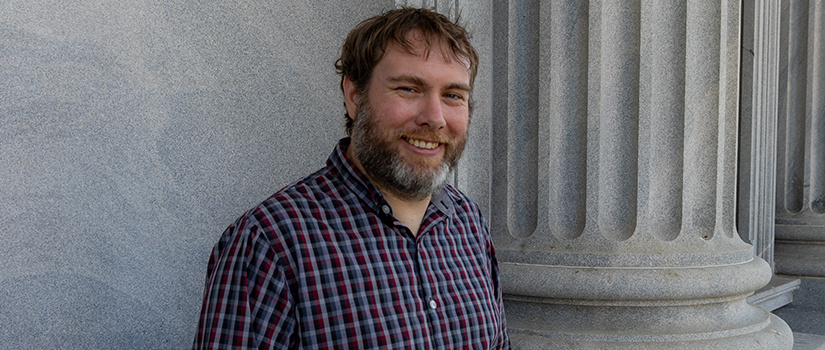Joshua Meyer-Gutbrod has revolutionized the experience for political science students since he joined the College of Arts and Sciences in 2020.
He has created a semester-long Senate simulation class that allows students to practice politics by role-playing senators. In addition to being popular with students, the class has attracted nationwide attention, and Meyer-Gutbrod’s guidebook for the course will be published later this year.
He also revamped his department’s internship program, helping more students find internships in state and local government, both in the political science department and in the wider student body at USC.
For these reasons and many others, Meyer-Gutbrod is the recipient of a 2024 Professional Track Teaching Award from the College of Arts and Sciences.
“Under his leadership, our students have experienced innovative classes and newly energized out-of-the-classroom opportunities and research projects,” writes Kirk Randazzo, chair of the Department of Political Science.
In recognition of his accomplishment, we asked Meyer-Gutbrod to share a few thoughts on his approach to teaching.
What inspired you to become an educator?
I joined academia because it offered the dual opportunity to conduct research on topics I was directly interested in while also engaging in education opportunities to share that research with students. In both regards, my focus has always been helping students step past the facades of partisan-electoral politics and better understand the actual mechanisms of governance. This has dictated my research agenda into state and local politics and my approach to teaching, which requires students to step into these roles and understand this process in a direct way.
How do you approach teaching, and what should students expect when they enroll in one of your classes?
My approach to teaching centers on integrating student experiences with educational content to provide a more robust learning environment and give students the chance to connect academic learning with real-life skills and examples. In entry level classes, this frequently involves connecting theories in political science with experiences they have in their daily lives. Concepts like free-riding, collective action problems, and even legislative bargaining all have real life corollaries that enable students to connect with material.
In upper-level courses this means integrating experiential learning. This can come in the form of internship opportunities that connect student work experience with academic learning or courses that incorporate simulations so students can actively engage in the political organization, rulemaking and deliberation of political actors to better understand the concepts and theories that explain their behaviors.
What are some of the moments or accomplishments that make you most proud of your work at USC?
First and foremost, I am proud of the growth and expansion of the internship program. Watching the internship program grow from 2-3 students a semester to 45 in the latest iteration has been very rewarding. This has included integrating the program with new organizations and expanding into the legislature, new state agencies and the city of Columbia.
In addition, later this year I will be publishing my Senate simulation manual with Palgrave Macmillan. This came about in response to the top scholar in the field of congressional politics contacting me to use the simulation to teach a similar class at Princeton University. As a result, she encouraged me to reach out to publishers and put the text on the broader market. I look forward to continuing to teach it in future semesters here at USC.
What do you hope your students remember about you and your courses in 10 years?
I think the big takeaway from all of my classes is that politics is hard and there are tough choices to make. If someone is selling an easy solution to a political problem, they are probably lying to you to get your vote. However, there are also a lot of great people doing the behind-the-scenes work of governing. These people are thinking critically, engaging with people of all political persuasions and working hard to make government work for the citizens of this state and nation.
This is where I want to see our students end up and why I encourage them to think critically, explore the reality of governance through simulation and to explore careers where they can have these substantial impacts through research and policy implementation in the legislature, agencies and local government.
Who at USC has been a role model or mentor for you and your teaching?
My third semester teaching the Senate simulation, my TA approached me and expressed his surprise that so much of the substance of the simulation course reflected the best practices of integrative and experiential learning that he was studying through the Center for Teaching Excellence (CTE) certificate program. I simply informed him that this was because I had also taken the course and it had given me the idea for the simulation.
CTE has been incredible in their course offerings to help develop these courses, and I am pleased to be teaching one of the CTE Integrative and Experiential Learning classes next semester on integrating internships into the classroom. In addition, I have been very encouraged by all my partners at the state legislature, in state agencies and with the city, who have shared my goal of integrating USC students into internship programs to help foster pipelines for students into careers.
